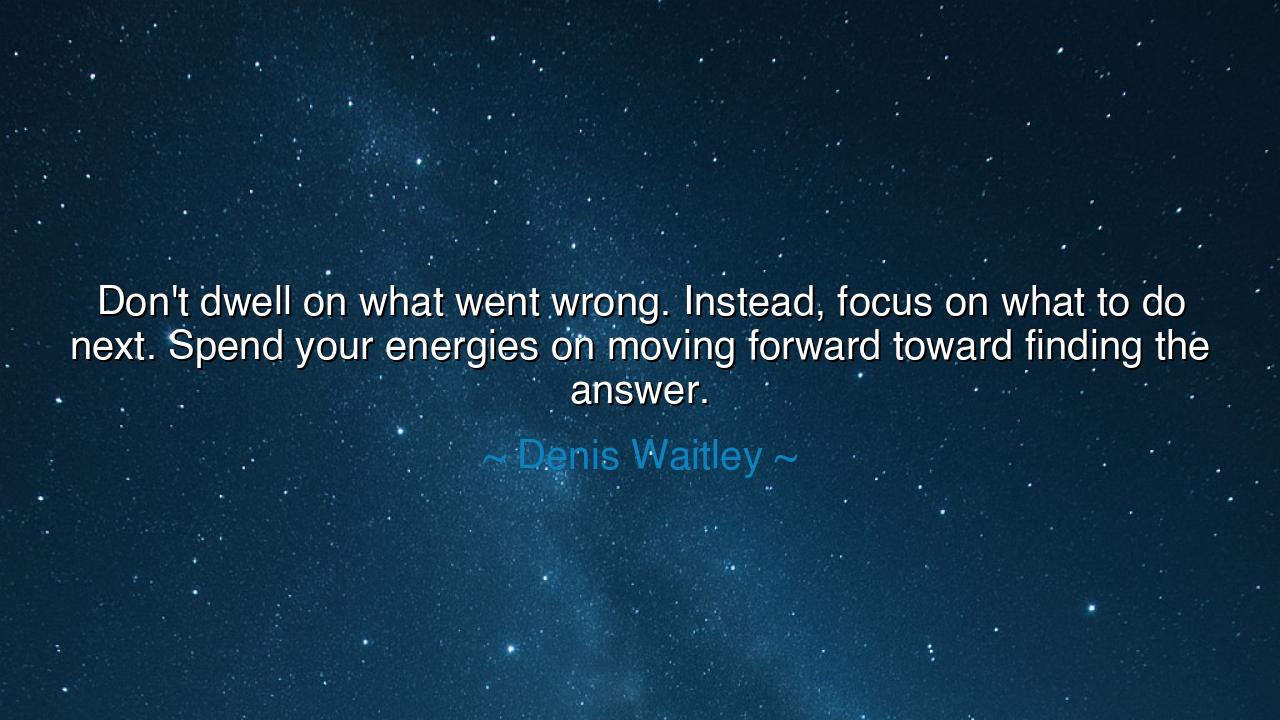
Don't dwell on what went wrong. Instead, focus on what to do
Don't dwell on what went wrong. Instead, focus on what to do next. Spend your energies on moving forward toward finding the answer.






“Don’t dwell on what went wrong. Instead, focus on what to do next. Spend your energies on moving forward toward finding the answer.” Thus speaks Denis Waitley, echoing an eternal wisdom older than the stones of the earth. His words are not merely counsel for the troubled heart; they are a map for the weary traveler who lingers too long among ruins. To dwell on what went wrong is to stand gazing at the ashes of yesterday while tomorrow’s fire waits unlit. To move forward is to take the ashes, scatter them to the wind, and build anew from the strength that still remains.
The ancients knew this truth well. When a warrior fell in battle, he did not lie on the ground lamenting his wounds; he struggled back to his feet, raising sword and shield again, for to stand still was to invite death. In the same way, the spirit that clings to failure decays, while the spirit that turns its eyes to what to do next begins to grow anew. Thus, Denis Waitley speaks with the voice of the sages when he calls us to cast off the chains of regret and turn our steps toward the path that leads to answers.
Consider the tale of Thomas Edison, the great inventor. He was no stranger to failure; it is said he tested thousands of materials in search of the perfect filament for the light bulb. When asked if he was discouraged, he replied, “I have not failed. I have simply found ten thousand ways that do not work.” Here is the very spirit of Waitley’s words made flesh. Edison refused to dwell on what went wrong, and instead bent his energies toward what to do next. It was this relentless forward motion, this unwillingness to linger in despair, that gave light to the world.
In this way, moving forward is not a denial of the past, but a transformation of it. We do not erase our wounds, but we weave them into wisdom. We do not pretend the failure never came, but we lift our gaze beyond it, as sailors who, when a storm shatters their sails, do not curse the tempest forever but set about mending the rigging to continue their voyage. For the seas do not stop raging, and the world does not wait for us; if we tarry too long in sorrow, we are left behind.
O sons and daughters of tomorrow, hear this: life will test you with moments of collapse. A plan will unravel, a friendship will falter, a dream will crack like glass beneath the weight of reality. In these hours you will be tempted to sit among the ruins, whispering, “Why me? Why now?” But those who linger too long among the ruins become ruins themselves. The stronger soul is the one who asks instead, “What must I do next? How can I use this broken stone to lay the foundation for a new temple?”
The lesson is clear: focus your energy not on regret, but on creation. The past is a shadow, unchangeable and silent; the future is a seed, waiting to grow in the soil of your actions. If you water the shadow with tears, nothing will bloom. If you water the seed with courage, resolve, and persistence, a harvest will surely come.
Practically, let each person do this: when failure visits, write down what went wrong in one brief sentence—no more. Then, beneath it, write three actions you can take next. Commit your energy to those steps, not to the single sentence of defeat. Train your mind to spend its fire not on lamentation, but on forward motion. Speak to yourself as Waitley spoke: “The answer lies ahead, not behind.”
So carry this wisdom as you walk: do not dwell, but advance. For life does not reward the mourners of the past, but the builders of the future. And those who heed this teaching will find themselves, like Edison, like the warriors of old, forging light out of darkness and triumph out of loss.






AAdministratorAdministrator
Welcome, honored guests. Please leave a comment, we will respond soon